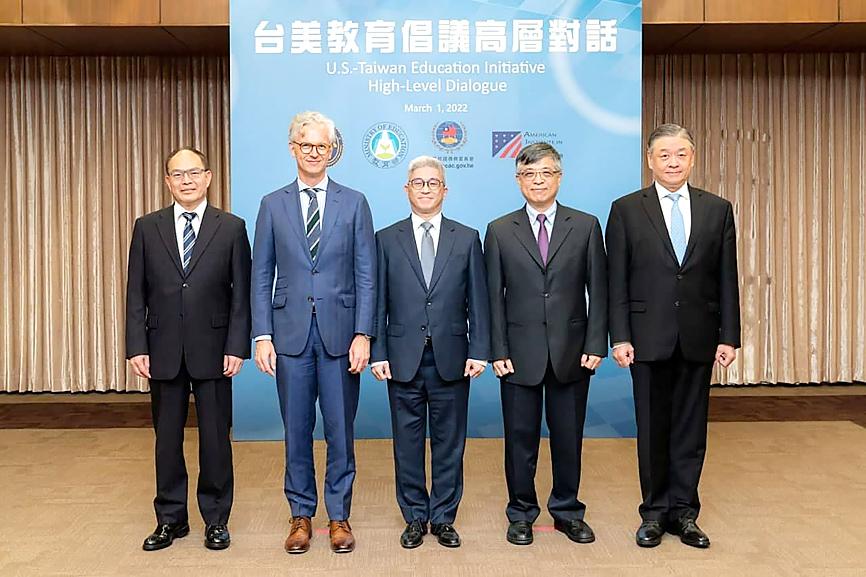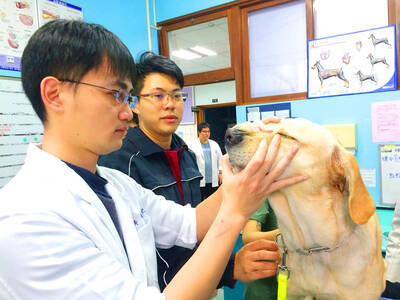A second round of high-level talks on educational cooperation were held on Tuesday between Taiwan and the US, with officials vowing to expand language exchange commitments made over the past year.
Established in December 2020, the US-Taiwan Education Initiative intends to expand opportunities for Americans to learn Mandarin and US teachers to help Taiwan reach its goal of becoming a bilingual nation by 2030.
Tuesday’s dialogue was held to assess achievements of the initiative thus far, as well as develop a plan for further cooperation over the next three to five years, the American Institute in Taiwan (AIT) said.

Photo: CNA
National Security Council Deputy Secretary-General Hsu Szu-chien (徐斯儉) and US Assistant Secretary of State for East Asian and Pacific Affairs Daniel Kritenbrink led the two-hour dialogue, held via teleconference.
The AIT vowed to “help ensure that US campuses remain bastions of innovation and intellectual freedom, values we share with Taiwan.”
Scholarship funding from both sides was increased under the initiative, including US Department of State language exchanges and Fulbright teaching programs, the Ministry of Foreign Affairs said in a press release yesterday.
Taiwan’s Huayu Best Program saw strides in facilitating Mandarin teaching exchanges between universities, while 15 Taiwan Centers for Mandarin Learning have been opened, setting the program on its way to establishing 100 centers in the US and Europe in the coming years, it added.
The Ministry of Education in May and June is to lead a delegation to the NAFSA Conference in Denver, Colorado, with a stopover in Washington to hold meetings and sign a memorandum of understanding on the Huayu Best Program and sister schools, it said.
Next year is to also see the first cohort of five to seven Taiwanese K-12 instructors teaching Mandarin in US schools through the Teachers of Critical Language Program, it added.
On the US side, dialogue attendees included US Department of Education Chief of Staff Sheila Nix, US Deputy Assistant Secretary of State for East Asian and Pacific Affairs Camille Dawson, US Deputy Assistant Secretary of State for Academic Programs Ethan Rosenzweig, AIT Managing Director for the Washington office Ingrid Larson and AIT Deputy Director Jeremy Cornforth.
Taiwan sent representatives from the education and foreign ministries and the Overseas Community Affairs Council, as well as Deputy Representative to the US Cheng Jung-chun (鄭榮俊).

Former Czech Republic-based Taiwanese researcher Cheng Yu-chin (鄭宇欽) has been sentenced to seven years in prison on espionage-related charges, China’s Ministry of State Security announced yesterday. China said Cheng was a spy for Taiwan who “masqueraded as a professor” and that he was previously an assistant to former Cabinet secretary-general Cho Jung-tai (卓榮泰). President-elect William Lai (賴清德) on Wednesday last week announced Cho would be his premier when Lai is inaugurated next month. Today is China’s “National Security Education Day.” The Chinese ministry yesterday released a video online showing arrests over the past 10 years of people alleged to be

THE HAWAII FACTOR: While a 1965 opinion said an attack on Hawaii would not trigger Article 5, the text of the treaty suggests the state is covered, the report says NATO could be drawn into a conflict in the Taiwan Strait if Chinese forces attacked the US mainland or Hawaii, a NATO Defense College report published on Monday says. The report, written by James Lee, an assistant research fellow at Academia Sinica’s Institute of European and American Studies, states that under certain conditions a Taiwan contingency could trigger Article 5 of NATO, under which an attack against any member of the alliance is considered an attack against all members, necessitating a response. Article 6 of the North Atlantic Treaty specifies that an armed attack in the territory of any member in Europe,

LIKE FAMILY: People now treat dogs and cats as family members. They receive the same medical treatments and tests as humans do, a veterinary association official said The number of pet dogs and cats in Taiwan has officially outnumbered the number of human newborns last year, data from the Ministry of Agriculture’s pet registration information system showed. As of last year, Taiwan had 94,544 registered pet dogs and 137,652 pet cats, the data showed. By contrast, 135,571 babies were born last year. Demand for medical care for pet animals has also risen. As of Feb. 29, there were 5,773 veterinarians in Taiwan, 3,993 of whom were for pet animals, statistics from the Animal and Plant Health Inspection Agency showed. In 2022, the nation had 3,077 pediatricians. As of last

XINJIANG: Officials are conducting a report into amending an existing law or to enact a special law to prohibit goods using forced labor Taiwan is mulling an amendment prohibiting the importation of goods using forced labor, similar to the Uyghur Forced Labor Prevention Act (UFLPA) passed by the US Congress in 2021 that imposed limits on goods produced using forced labor in China’s Xinjiang region. A government official who wished to remain anonymous said yesterday that as the US customs law explicitly prohibits the importation of goods made using forced labor, in 2021 it passed the specialized UFLPA to limit the importation of cotton and other goods from China’s Xinjiang Uyghur region. Taiwan does not have the legal basis to prohibit the importation of goods